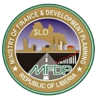ICE Commences 22nd Session in Liberia
Harbel, Margibi County - The 22nd Session of the Intergovernmental Committee of Experts (ICE) of West Africa commenced Monday May 6, 2019, in Robertsfield, Margibi County.
The session is being held under the theme “National Capacities and Mechanisms in Evaluating Progress in the Implementation of Agendas 2030 and 2063: Assessment of Challenges and Prospects in West Africa”. The ICE is a body established by the United Nations General Assembly.
Delegates during the two-day session will discuss recent developments likely to impact economic and social development in West African countries, with a view to identifying major challenges to be addressed and to propose guidelines for accelerating sustainable development in West Africa through the transformation of the economies of the sub-region.
Liberia’s Deputy Budget Minister Hon. Tanneh Brunson speaking at the start of the session said Liberia as a member state of ECOWAS, remains deeply committed to continuing her partnership with sub-regional bodies.
She lauded the Economic Commission for Africa (ECA) for its continuous support to Liberia in making sure that the country jointly achieves the United Nations 2030 Agenda of the Sustainable Development Goals (SDGs), and the African Union’s Agenda 2063.
Deputy Minister Brunson told the gathering that the government of Liberia has adopted the global and continental frameworks of UN 2030 Agenda and AU 2063 Agenda among others. She indicated that the AU 2063 agenda is developed as a vision for “The Africa We Want” by Heads of State in May 2013 and it is a long term development framework that aims to materialize Africa’s vision of an integrated, prosperous and peaceful Africa, driven by its own citizens and representing a dynamic force in the world.
The SDGs, she explained, speaks to socioeconomic development issue and reflects stronger environmental concerns, adding that government is committed to development despite current challenges.
However, she encouraged delegates to develop actionable and transformative steps aimed at reducing poverty and other forms of backwardness in the region and actions that will bring in paradigm shift development styles which will benefit the current generation and not compromise the survivability of the generation yet unborn.
Speaking earlier, Bakary Dosso, Director of the ECA Office for West Africa said the SGDs represent an unprecedented opportunity to eliminate extreme poverty and put the world on the path to sustainable development.
Mr. Dosso thanked the Government of Liberia for agreeing to host the meeting of experts from West Africa to discuss what he termed a topic of great interest to the sub-region.
Giving a rough estimate of West Africa, Mr. Dosso said that it shows out of an estimated population of 377 million in 2018, just over 200 million or 53.5 percent of the people live below the national poverty line, something he added demonstrates the magnitude of the challenges of everyone.
Accordingly, he said that countries in the sub-region need to make major reforms to their macroeconomic and financial frameworks, invest in human capital, tackle infrastructure deficits, improve the business climate to meet the challenges and positively and sustainably reverse trends.
Mr. Dosso said the success lies in the ability of the national leadership to execute on time, to monitor and evaluate the implementation of the different agendas to which it has committed for the transformation of their respective countries and the continent.
He pointed out that institutional capacity for evaluation and monitoring of development agendas has been identified as one of the missing links in development processes in West Africa.
The ICE meets annually to discuss economic and social performance, based on working documents prepared by the Sub-regional Office for West Africa of the Economic Commission for Africa.
The Sub-regional Office for West Africa, based in Niamey, covers the 15 member countries of the Economic Community of West African States (ECOWAS), to include: Benin, Burkina Faso, Cape Verde, Cote d’Ivoire, the Gambia, Ghana, Guinea, Guinea-Bissau, Liberia, Mali, Niger, Nigeria, Senegal, Sierra Leone and Togo. Experts from these member States form the Intergovernmental Committee of Experts of West Africa.
It is also the statutory framework of the ICE, for member States to oversee the development and implementation of the Office’s work programme; monitor its activities, as well as provide guidance for the Office's programmes by ensuring that sub-regional priorities are included as much as possible.
In addition, the ICE makes recommendations on economic and social development issues in the sub-region, and these may, as appropriate, be considered by the joint ECA-African Union meeting of the Conference of African Ministers of Finance, Planning and Economic Development.
The ECA, established by the United Nations Economic and Social Council, is one of five United Nations regional commissions mandated to promote the economic and social development of Africa. Its five sub-regional offices translate its normative and analytical work into operational activities in the sub-regions.
These bureaus fulfill their mandate by: providing technical assistance to the regional economic communities and member States on policy harmonization, and provide guidance on meeting their specific needs; facilitating regional integration by serving as focal points for policy dialogue and information sharing between the Commission and stakeholders in the sub-regions.
The meeting is being held at a time when the region is undergoing major developments as member states continue to take steps to enhance development, which remains slow despite a decade of economic growth in many countries.
Those steps also aimed at aligning national development strategies, as closely as possible, with the Sustainable Development Goals and Agenda 2063.
Latest Press Release
Calendar
Location
P. O. Box 10 - 9016
Broad & Mechlin Street
1000 Monrovia
info@mfdp.gov.lr




